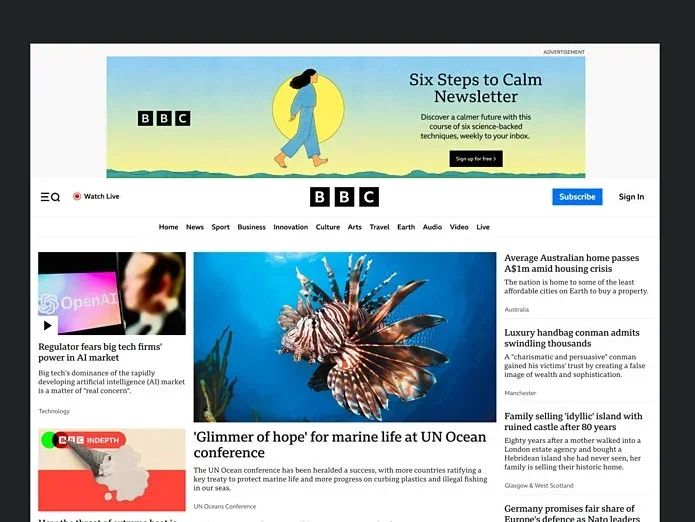
The BBC has launched its first website paywall, charging users in the US for unlimited access to news on BBC.com.
The cost will be $8.99 (£6.55) per month or $49.99 (£36.40) per year. For comparison CNN’s website paywall, which launched last autumn, costs $3.99 monthly.
The BBC said it will be a dynamic paywall, meaning all users visiting from within the US will be assessed by an engagement-based model around how much they read and how long they stay. This means there is not a standard number of articles readers will get for free before they are asked to pay.
The corporation said the new model would offer its most loyal visitors a more premium experience (although there will still be adverts).
Initially, paying users will get unlimited access to website articles and the 24/7 BBC News Channel livestream.
In the next few months other features will be added including ad-free documentaries, ad-free and early release podcasts and exclusive newsletters and other content.
Users who don’t pay but hit the paywall will still be able to access select global breaking news stories, BBC Radio 4 and BBC World Service radio livestreams, BBC World Service Languages websites, and some free newsletters and podcasts.
Rebecca Glashow, chief executive of BBC global media and streaming, said: “Over three years ago, we set out on a bold mission: to completely reimagine how we deliver the BBC’s world-class news and factual content to consumers in the US. Our goal? To serve our audiences better than ever before—and unlock new opportunities for growth.
“Today, the next phase of that vision becomes reality. We’re bringing more of the BBC’s trusted, high-quality content together in one powerful, easy-to-access destination.
“Over the next few months, as we test and learn more about audience needs and habits, additional long-form factual content will be added to the offer for paying users. This is a major milestone and just the beginning of an exciting new chapter.”
The BBC said BBC.com reaches 139 million visitors globally, of whom almost 60 million are in the US.
Similarweb data shared with Press Gazette showed BBC.com had 107 million visits in the US in May, meaning it was the tenth biggest news website in the country by that metric (just behind USA Today on 109.5 million visits).
The BBC doubled its newsroom capacity in the US last year when it relaunched BBC.com and its app for audiences outside the UK.
Tara Maitra, BBC Studios chief commercial officer, global media and streaming, told Press Gazette’s Media Strategy Network USA event in New York in March that BBC.com had seen double-digit traffic growth for the previous seven months in a row.
“We’re growing at a faster rate than many of our commercial news competitors at a time when we’re all experiencing a busy and active news cycle, which tells me its due largely to the strength of our journalism and all the efforts we’re putting into transforming our global digital presence,” Maitra said.
Licence-fee payers travelling from the UK to the US for holiday or work will still be able to access the BBC News app as usual as long as they had the latest version downloaded before they travel.
The BBC said there are no current plans to introduce a paywall “outside of North America”.
BBC Studios VP for marketing and growth Sam Mellor spoke up for the BBC has a home for online advertising at the Cannes Festival noting: “We see plus 80% lifts in likelihood to recommend, likelihood to be seen as trustworthy, likelihood to be seen as an innovative brand for advertisers that work with us and spend in our ecosystem.”
The launch is led by both BBC News and BBC Studios, the main commercial arm of the BBC which made £1.8bn in revenue last year and a third consecutive year of profits above £200m.
BBC Studios is said to be carrying out an “ongoing effort to grow international commercial revenue that helps fund the BBC’s journalism and storytelling and delivers greater value for the licence fee”.
Email pged@pressgazette.co.uk to point out mistakes, provide story tips or send in a letter for publication on our "Letters Page" blog
